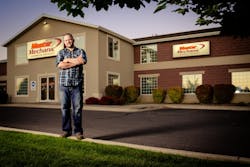In just five minutes, “everything changed” for Kevin Paul.
This isn’t some exaggeration or hyperbolization he throws around lightly. Six years ago—after five minutes on the phone with his new business coach—Paul, who was on the verge of abandoning his auto repair shop, realized all at once what had been holding his business back for years. It was something so simple, yet something he believes is so common in this industry:
He was afraid to ask for help.
“There are a few times in life that you get overwhelmed, and you just know this is right,” Paul says. “And talking to Gary, I had this overwhelming sensation.”
Paul, owner of Alpha Automotive in McDonough, Ga., is referencing Gary Gunn, CEO of Turnaround Tour. Gunn provides one-on-one coaching, but his company (which was recently bought by ShopPros) also hosts 20 Groups—a networking system where shop owners gather a few times per year to exchange ideas and evaluate each other’s businesses. And through those groups, Paul found ideas and processes that flipped his flailing business 180 degrees, improving his overall gross profit margin from around 30 percent to nearly 60 percent between 2011 and 2017.
Every shop owner Ratchet+Wrench spoke with, in fact, echoed a similar sentiment. Profit margins, customer retention, marketing campaigns, tire sales, shop culture, leadership skills—you name it, and somebody at one of the thousands of shops across the country has an idea for improving it at your shop. And there are several companies administering 20 Groups in this industry that are just waiting for your call.
Following are three stories about how 20 Groups changed operations at three different shops.
How 20 Groups Work
—
Most 20 Groups feature a similar general setup:
- You’re placed in a group of 10–20 shop owners. Everyone meets regularly at each other’s shops throughout the year.
- You’ll have access to one-on-one training from dedicated business coaches.
- You can expect flight costs when traveling to 20 Group meetings and conferences.
- Many companies also host online meetings/webinars.
Learning to Lead
Tyson Anderson’s story probably sounds familiar to anyone in the automotive repair industry: A technician turned owner, Anderson had little knowledge about how to run a business, from either a financial or leadership standpoint.
“When I first took over shop, I was very shy. I had a hard time speaking to groups,” says the owner of Master Mechanic Automotive Specialists in Providence, Utah. “I knew how to work on cars and that was it. That’s what I was good at.”
In theory, putting a green shop owner in a room with seasoned veterans seems too daunting to handle. But since his uncle (the shop’s previous owner) was part of the Bottom-Line Impact Group at RLO Training, Anderson naturally took his place at the 20 Group meetings.
What could Anderson possibly have to offer the members of this group?
Well, Anderson thought the same thing at first—but that all quickly changed.
A Culture of Mentorship
It didn’t take long for Anderson to realize the biggest benefit of his situation: the mentorship. And by that, he doesn’t mean established business owners coaching him to lead the $1.4 million shop that stands today—he’s talking about cross mentorship. Anderson not only learned how to lead his Master Mechanic team, but he also learned how to help other shop owners that seemingly had everything in order.
“When you first get in, you feel like you don’t have valuable input to give,” he says. “Then, as you go through other people’s shops, you find there’s situations you’ve been in and have experience with. You start to contribute, put your ideas forward, save them from going through the same headache.”
Despite being mentored by his uncle on how to track P&L statements and balance sheets, Anderson didn’t get his first dose of outside-the-shop mentorship until he gave 20 Group members a tour of his shop. As they passed through his facility, the shop owners offered constructive criticism on procedures that could either be improved or eliminated—namely the shop’s inspection program (see sidebar: A Better Inspection).
Anderson has fed off that energy and turned it on other shops, suggesting processes and policies that have made huge changes.
He then transferred that confidence to his own team, which he now leads with confidence. He shares resources and books suggested by his 20 Group members with his employees to build their leadership skills as well. In turn, these days, Anderson regularly receives feedback from his own team on how to improve the shop.
“Over time, you get to know each other, and they want nothing but the best for you,” he says of his 20 Groups team members. “There’s never any ill will or competition. They find it exciting to see you improving.”
The 20 Group Takeaway:
A Better Inspection
These days, it seems so simple to Tyson Anderson.
But until his 20 Group toured Master Mechanic Automotive Specialists, Anderson had no idea his shop’s inspection process was so overly complicated.
“We always had a low ARO,” he says, “so I asked, ‘What can we do?’ And then I got advice on how to simplify the inspection process.”
Here are three simple changes suggested by his 20 Group—changes he says anyone can easily implement:
Cut down the inspection list. Anderson decided to simplify his complex two-page inspection to a one-page list that covers basics, like safety items and major leaks.
Limit the inspection time. Anderson encouraged his technicians to limit time spent on inspections. With the condensed list, inspection time went from 45 minutes to 15. Now, technicians don’t get lackadaisical with long, drawn-out inspections, and only cover the necessities as quickly as possible, improving productivity.
Personally train your technicians. Anderson sat down with his technicians to cover how to properly inspect cars. He not only trained them to concentrate on repairs that lead to a higher ARO, but also improved his communication and leadership skills.
STATS: ACCURATE AUTOMOTIVE ATTENTION Location: Two facilities in Yuma, Ariz. Staff Size: 30 (includes quick lube) Average Monthly Car Count: 440 Annual Revenue: $3 millionA Unified Pack
Russell McCloud’s 20 Group isn’t a gathering, a collection—heck, he doesn’t even refer to it as a group.
No, at Elite, his 20 Group is a pack.
“It’s like a 20 Group—but on steroids,” he says.
His operation, Accurate Automotive Attention in Yuma, Ariz., is one of 90 shops in Elite’s Pro Service program, which splits those shops into 10 “packs.” Then, each year, two of those packs combine so each Elite member gets new feedback and ideas regularly thrown at them.
And because he is constantly rotating between familiar and new shop owners, McCloud has become a pro at integrating into and taking advantage of 20 Groups.
Preparation, Notation, Implementation
When you step into a 20 Group for the first time, McCloud understands how intimidating it can be.
But when you break it down to its simplest elements? It’s no different than any classroom setting at school.
That’s why McCloud “studies” for his meetings. He sits down with his management team and identifies the biggest headaches at his two Yuma, Ariz., shops.
Then, at the 20 Group meetings, with notepad in hand, McCloud not only goes through his prepared questions with other shop owners, but also diligently takes notes and maps out plans for implementation at his shops.
“I’m asking questions, making people cover it again and again,” he says of his approach at 20 Group meetings. “Otherwise, I won’t fully get it or remember when I go back.”
Through this back and forth, McCloud builds on the feedback, making suggestions that cater to his operations’ strengths (which, for example, have a heavier amount of quick lube work than his pack members).
Then, when McCloud heads home, he meets with his management team once again and goes through the ideas. Because of his detailed notes, he’s well prepared for inquiries and criticisms.
“Implementation is difficult,” he says. “Some of it gets done, some of it doesn’t. I have to be patient. If I push too hard, it makes everyone around me crazy. It’s difficult to run everything when you turn it upside down.”
But when an idea settles and change slowly starts to take place? It’s huge, and produces an ROI for the 20 Group fee, McCloud says. To prove it, he references his two biggest 20 Group takeaways: profiting off shop supplies and improving customer retention (see sidebars).
20 Group Takeaway #1:
Charging for Supplies
Originally, Russell McCloud got pushback from his team overcharging for shop supplies.
Today? It’s a necessity.
“It took nine months. We did it a little bit, then bumped it up a couple times,” he says. “Now it makes up for everything I pay to be in the Pro Service program.”
Basically, this means charging for anything you instinctively would not bill for: mop buckets, solvents, windshield wiper fluid—the list goes on. It’s all included as a line item on ROs and tracked.
This practice has added thousands of dollars to the shop’s bottom line.
20 Group Takeaway #2:
Improved Customer Retention
You’ve undoubtedly heard this before: It’s more expensive to attract new customers than retain them.
But once McCloud implemented some advice from his 20 Group, he found it wasn’t only less expensive—it was a million times easier.
Instead of funneling money into the marketing budget, Accurate Automotive Attention instead concentrates on impressing first-time customers, who do not leave the facility without a welcome gift bag full of goodies.
McCloud runs a report on the first-time customers each week. His team then calls those customers, asking about quality of service and if the shop can improve in any way. McCloud says it’s helped word-of-mouth marketing.
Also, McCloud’s service advisors are sure to book the first-time customer’s next service appointment right then and there, and then follow up once again before that appointment.
STATS: ALPHA AUTOMOTIVE Location: McDonough, Ga. Staff Size: 8 Number of Lifts: 9Average Monthly Car Count: 425 Annual Revenue: $1.4 millionThe Power of Humility
It’s enlightening, invigorating, motivating to receive advice from other shop owners regularly.
But it’s also ... strange. Strangely enough.
“Different things at different times are happening,” says Kevin Paul, owner of Alpha Automotive in McDonough, Ga. “Sometimes you find the answer to a problem you didn’t even realize you had.”
Imagine wholeheartedly believing that you understand your business front to back, and then realizing you don’t even fully understand or take advantage of your processes. After six years of participating in Turnaround Tour, the 20 Group veteran still experiences that “strange” feeling meeting after meeting.
Luckily, that strange feeling isn’t so bad—in fact, it’s allowed Paul to understand the importance of humility when leading an operation.
The Need for Change
When you ask Paul to nail down the biggest change made to operations, he simply cannot do it.
He can, however, list off several small changes that have led to Alpha Autmotive’s gross profit margin increasing nearly 30 percent and annual revenue doubling to $1.35 million over the past five years.
All of those different little changes? Today, they mean everything to Alpha Automotive’s identity. The importance of selling maintenance, the revamped focus on tire sales (see sidebar: The Tire Package), the firing of toxic employees, the hiring of team players, the expansion of direct mail marketing—all of those suggestions came from other shop owners.
And learning to accept that advice was the hardest part for Paul. But it was also the most important step to fixing his business.
“As humble and desperate as I was, I had resistance,” he says. “That fear of change is greater than the need for change. That’s where I see the success of these meetings.”
The humility of realizing he didn’t have all the answers allowed Paul to not only become a leader for his team, but also to be a helpful member in his 20 Group. Now, he’s not only improving his own operation, but the entire industry by passing along his knowledge.
“It’s about learning a life lesson, not a business lesson,” he says. “If you're not ready to change, do not join a 20 Group.”
The 20 Group Takeaway:
The Tire Package
At one of Kevin Paul’s very first 20 Group meetings, another shop owner took one long, hard look at Paul’s business and asked: “Why would you want to sell tires?”
It was, honestly, a good question. With a 10 percent profit margin on tire sales, Alpha Automotive was most certainly not taking advantage of the rather miniscule revenue stream.
So, right after that meeting, Paul decided to raise prices on tires. On top of that, he started selling five oil changes in a package, throwing in a deal for tires.
While the number of tires sold went down, overall tire sales and profit margins skyrocketed.
Notable 20 Groups
Here are the most popular 20 Groups in the industry, helpfully compiled by Ratchet+Wrench editorial advisory board member, Ron Haugen.
Automotive Training Institute
ATI 20 Groups have bi-annual (in-person) two-day meetings, virtual meetings in between, along with the ATI 20 Group Summit at an annual conference. The two-day meetings include video shop tours, financial and KPI reviews, goal setting and review, and more.
Contact:
Bryan Stasch
Elite
Elite Pro Service consists of 90 shop owners. They share business strategies on monthly web-based meetings, meet with 20 other shop owners twice per year, and network with all 90 colleagues at an annual conference. Participating shops work with coach Jim Murphy.
Contact:
800.204.3548
Management Success!
Members meet about set goals monthly during online meetings. Shop owners tour one another’s facilities throughout the year. During visits, Management Success! hosts a workshop. The groups also meet at bi-yearly conventions.
Contact:
www.managementsuccess.com/contact
Repair Shop Coach
Groups meet three times per month over the phone or video chat, and in person three times per year in a workshop setting.
Contact:
www.repairshopcoach.com/contact-us
RLO Training
RLO Training’s 20 Groups are known as Bottom-Line Impact Groups and meet for three days, three times per year in each 20 Group member’s city. John Wafler serves as the company's faciliator and coach.
Contact:
800.755.0988
Shop Fix Academy
Shops meet four times per year for three days. Founder Aaron Stokes describes it as “a very intense time of learning and having fun.” There are also group calls and video lessons in between meetings.
Contact:
TJ Roberts
Transformers Mastermind
There are several different levels for this company’s Masterminds Groups that cover single-store and multi-store operations for both shop owners and managers. Groups of 12–16 shops meet for two full days four times per year. The company also offers perks such as webinars and service advisor bootcamp.
Contact:
www.transformersmastermind.com/contact
Turnaround Tour/ShopPros
Three times per year, shop owners visit each other’s businesses. Those same shop owners, each month, gather for one four-hour session. ShopPros also hosts webinars throughout the year.
Contact:
http://www.shoppros.ca/contact
Vin Waterhouse Supper Club
Groups of 6–10 shop owners meet throughout the year at each other’s facilities to conduct/attend tours and offer business advice.
Contact:
Vin Waterhouse



